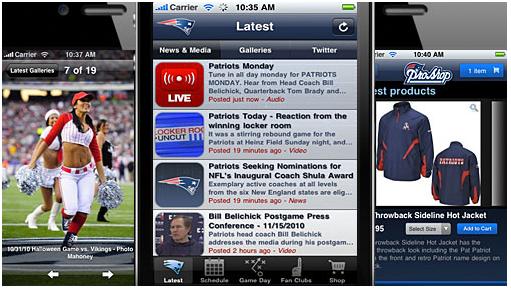We’re launching a new customer Q&A series, where we chat with our customers about how they’re using log data, their technology stack, and their overall industry insights. We love talking to our users, because we always learn something new – and we’d like to share those insights with you.
In our first interview, we caught up with Craig Heneveld, Director of Technology at Adept Mobile in Boston, to talk about the development challenges and successes of bringing big sporting brands to mobile devices.
Logentries: Tell us about Adept Mobile. What do you do?
Craig: We’re an application development company that creates mobile apps and websites for major sports brands in the NBA and NFL like the New England Patriots, Miami Dolphins and Boston Celtics. We extend their brand, content and products to mobile devices.

Adept Mobile brings the New England Patriots brand, content and products to mobile devices
Logentries: What makes Adept Mobile so cool is that you’ve got some seriously high-profile customers – and their users consume all sorts of content from static pages to live streaming video. How do you go about bringing all the various pieces together for mobile devices?
Craig: We have a platform, called “Nexus,” that aggregates and optimizes content from multiple online sources to deliver it consistently across all target devices.
Logentries: On the note of “consistent delivery,” you’ve mentioned before that one of your biggest challenges is predicting demand capacity, since users typically consume content based on some type of event – be it a game, news announcement, draft or otherwise. This can cause major (and unexpected) spikes in demand. How do you handle this?
Craig: Log management is a big deal for us. As the president [Gabe Smallman] here likes to say, no one ever got fired for logging too much… During development and deployment, we benchmark performance by load testing, and use Logentries to help us understand any issues that might occur, so we can address them beforehand. We also use our own Heroku add-on solution, Adept Scale, which prevents performance degradation from unexpected increases in traffic.
Logentries: Nice. We agree that you can never log too much J. How else are you using logs to help you?
Craig: Well, we rely on logs for many things. We continuously monitor our apps in production for any errors that may arise. For example, if a user is unable to purchase a Patriots sweatshirt from the app, this costs the team money. We need to know right away if such an error occurred, why it happened, and be able to fix it immediately. We’ll settle for nothing less than an optimal mobile experience for our customers and their users.
Logentries: In addition to Logentries and Adept Scale, what’s in the rest of your software stack? Also, can you tell us more about Adept Scale?
Craig: The main technologies we employ today are Logentries, AdeptScale, Heroku, Blitz, MongoDB, and Memcached. As for Adept Scale, it’s is our own add-on solution for Heroku, which provides automated web dyno scaling on Heroku applications. It works by ingesting and processing an application’s syslog drain, and then recommends dyno usage and scales dynos if needed. It helps manage spikes in traffic while also saving money by reducing the number of running web dynos during low traffic periods.
Logentries: Got it. Sounds critical to any application with major swings in traffic. So tell us – what’s next for Adept Mobile?
Craig: We’ll continue bringing big brands to mobile devices, while expanding the presence of those we’ve already developed. Additionally, we’ll continue to build out Adept Scale. It currently only supports web dynos, and we’re actively developing a general solution for scaling other kinds of dynos (worker, clock, etc.).
Logentries: That’s definitely technology that many Heroku users could use, so we’re glad to have the chance to talk about it on our blog with you. It’s been great learning about Adept Mobile, and we really appreciate your time. Thanks Craig!
